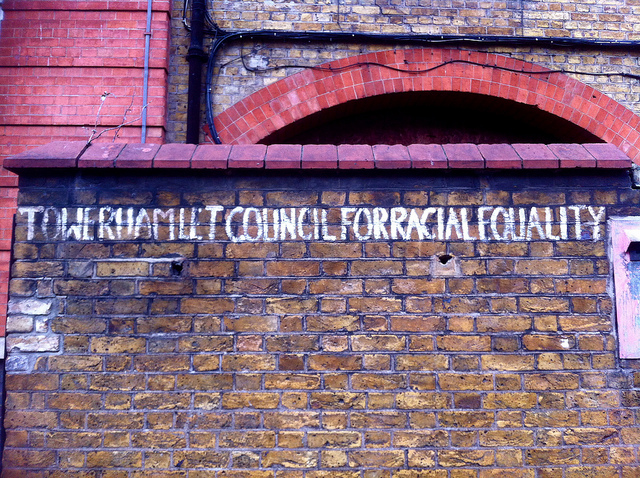Events in the local elections in Tower Hamlets have provoked national interest and display worrying signs of division
The Tower Hamlets political scene has long been known for its unique flavour and numerous idiosyncrasies. May 22nd’s Mayoral election was one of the most interesting chapters yet, with the incumbent Lutfur Rahman winning re-election in controversial circumstances. Here, the former Leader of Tower Hamlets Council Michael Keith, reflects on what the election means for the Borough, and argues for the cultivation of a new politics for the area that transcends racial, religious or ethnic division.

Lutfur Rahman was re-elected as Mayor of Tower Hamlets in controversial circumstances (Credit: Timrich27, CC BY NC ND 2.0)
Following a conversation at the vote counting, Ted Jeory asked for a personal reaction to the outcome of last week’s local elections. It followed what I think was a sense shared that regardless of party affiliation the divisive politics of Tower Hamlets had reached a particularly worrying moment.
Occasionally boisterous, too frequently threatening, the scenes at the Tower Hamlets mayoral count prompted a storm. Shut inside the Troxy venue when supporters of the independent mayor Lutfur Rahman and his party Tower Hamlets First began pre-emptively celebrating his re-election, the mass surge to access the vote count prompted anger amongst council officers and campaigners alike.
Some with a longer memory may cast their minds back to similar scenes outside York Hall that greeted the success of Peter Shore in 1987 and 1992 and fairly protest that mainstream parties commented on this less at the time.
But in 2014 it followed a day, a night and a campaign in which the sense of polarisation between camps was particularly disturbing, confrontations and intimidation of voters on the polling stations and a level of abuse that was particularly fractious.
It was hard to avoid a sense that tensions that border on worrying divisions were on show. As with much in Tower Hamlets, geographical proximity and cultural distance may be inversely related. The ability of Lutfur and his candidates to appeal to 30-40,000 voters across the borough is impressive. But it might be more worrying if the demographic of his support is as monochrome as that of his successful candidates.
The East End has seen the outcome of a polarised politics before and it is not pretty. The claim that Lutfur’s regime speaks to an agenda of the left is confounded by the policy agenda that he has followed. His popularity instead speaks more to the strengths of community networks, Sylheti ties and the mobilising forces of his political machine.
The strengths of these solidarities represent much of what is both best and worst about East End politics. The ability of strong family ties and community links to generate both a sense of a communal collective identity and an overbearing sense of peer pressure is long recognised. And it would be foolish to ignore the numbers of non (British) Bangladeshi voters that supported an incumbent mayor with an established publicity machine.
But the results are stark. It is doubtless possible for the Tower Hamlets First group of 20 councillors (as as May 28) and one mayor–all but one men, all of Bangladeshi heritage–to represent the rich diversity of the borough. But it will be challenging to do so. The 2011 Census counted that 17 ‘minority ethnic’ identities had populations over 1,000 and 33 per cent of households have more than one ethnicity represented at home. And just as it was widely considered unrepresentative to have diverse parts of London represented by old white men over the age of 50 in the 1980s and 1990s, the same logic might be thought to challenge the newly elected members of Mayor Rahman’s party.
Trotsky allegedly suggested that if people voted the wrong way it might be necessary to abolish the electorate, an option open to few democratic parties. And so the challenges for the Labour Party are also enormous. As well as losing the mayoral vote by a narrow margin there are fewer elected Labour councillors in Tower Hamlets than at any but one election since the borough was founded in 1964. Quite simply, this is the worst election result for the Labour Party in Tower Hamlets in 24 years.
More women will be elected by Labour, but proportionately significantly more of the successful Labour councillors are white than was the case after the election four years ago. The collapse of the Liberal party nationally and locally has left easy pickings in parts of Bow where candidates were barely opposed but across the rest of the borough the outlook was bleaker. In the longer term things will probably balance out as people mix, things move on, old people move out and new people move in. Indeed it is at times alleged that some of the councillors move to the suburbs before they let on about it to the returning officer.
Party politics is a minority sport and council life just one aspect of East End life. But in the shorter term it cannot bode well for the borough to have social divisions paraded in this way. For the mayor a challenge that sits along with the result is whether his party and his rule can reach beyond his core electoral base.
For the Labour party there is a question of whether it can learn again to understand and connect with the dynamics of community life that underwrite Lutfur’s appeal. It has to do more than tell the voters they made the wrong choice. But for all of the borough’s residents, the hope has to be that all concerned identify the danger of the present moment.
People need to recognise that diverse roots that bring people to the borough must be respected whilst building a future that is shared. To do so it will be imperative to develop a politics that transcends racial, religious or ethnic division or else the consequences for the East End could be serious.
—
Note: a version of this post originally appeared on Ted Jeory’s ‘Trial by Jeory‘ blog. It represents the opinions of the author and not those of Democratic Audit or the LSE. Please read our comments policy before posting. The shortened URL for this post is: https://buff.ly/1kAZbZE
—
 Professor Michael Keith is the Director of COMPAS at the University of Oxford. He also has s a personal chair in the School of Anthropology at the University of Oxford. He is working on projects in the Labour Markets,Citizenship and Belonging, Urban Change and Settlement, and Welfare clusters. He was previously a politician in the East End of London, and has served as the Leader of Tower Hamlets Council.
Professor Michael Keith is the Director of COMPAS at the University of Oxford. He also has s a personal chair in the School of Anthropology at the University of Oxford. He is working on projects in the Labour Markets,Citizenship and Belonging, Urban Change and Settlement, and Welfare clusters. He was previously a politician in the East End of London, and has served as the Leader of Tower Hamlets Council.





 Democratic Audit's core funding is provided by the Joseph Rowntree Charitable Trust. Additional funding is provided by the London School of Economics.
Democratic Audit's core funding is provided by the Joseph Rowntree Charitable Trust. Additional funding is provided by the London School of Economics.
How can Tower Hamlets move beyond ethnic and religious division in its politics? https://t.co/NKo5AE2kJi
We need “a new politics … that transcends racial, religious or ethnic division” @democraticaudit https://t.co/z11u0FKIDh
Former leader of Tower Hamlets council reflects on the controversial recent elections https://t.co/AqdZ08sFvM
Events in the local elections in Tower Hamlets have provoked national interest and display worrying signs of division https://t.co/anKwwuJSEN
Events in the local elections in Tower Hamlets have provoked national interest and display worrying signs… https://t.co/wPsZ2CwRay